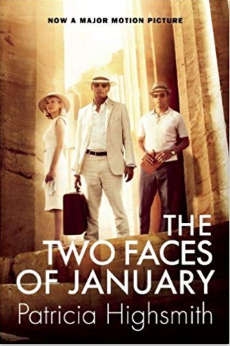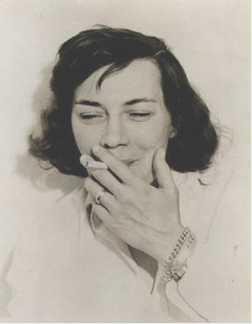|
Today's blog post is a guest offering by Michael Nutt, who has very kindly reviewed Patricia Highsmith's novel 'The Two Faces of January' for me. The novel has been made into a movie starring Viggo Mortensen, Oscar Isaac and Kirsten Dunst. Take it away, Michael! A rather curious title... Patricia Highsmith was the finest exponent of the psychological thriller. Her most famous works - 'Strangers on a Train' and the Tom Ripley cycle of novels - are some of the most enjoyable reads of my life. And now I must add the recently filmed 'The Two Faces of January', her ninth novel, first published in 1964, as one that I can thoroughly recommend. The rather curious title refers to the connection between the month of January, in which the story unfolds, and the Roman god Janus, in whose honour the Romans named the month. Janus is usually depicted as having two faces, as he looks both to the future and to the past. To the ancient Romans, Janus was the god of beginnings and transitions, and thereby associated with gates, doors, and passageways, as well as endings and time. You can find these themes appearing throughout the novel. The story begins with a passenger ship slipping through the Corinth Canal at night. On board are an American couple - Chester MacFarland and his young wife Colette - taking a vacation in Europe and arriving now in Greece. The opening descriptions are of a passage from one world to another, a transition between countries, but also an image that evokes birth, a new beginning. We soon learn that the man is a shyster on the run from the American authorities, trying to escape his past. Locked in an unspoken pact of murder Oscar Isaac (Rydal Keener) Oscar Isaac (Rydal Keener) They are observed by a slack young American, Rydal Keener, who is struck by Chester's resemblance to his recently deceased father (whose funeral he chose to miss), while Colette reminds Rydal a little of his cousin Agnes, his first, ill-fated love from some ten years ago. Rydal is using an inheritance to fund a couple of years away in Europe writing poetry and avoiding a planned career in law back in the States. He amuses himself by playing games of chance, and starts to include the American couple, so uncannily reminiscent of those people from his past, in his latest scheme even if he is unsure quite what it might be yet. Rydal is a particularly Janus-like character, looking both to the past and to the future. He carries the psychological scars of his relationship with his late father and his cousin Agnes, and this unfinished business in his past keeps drifting into the present and casting a fog over his future. Unwittingly, Chester and Colette drift onto his radar. By chapter three their worlds have collided - or dovetailed, it would be more accurate to say, as Chester and Colette find themselves locked in an unspoken pact with Rydal over an incidental murder. A tale of two Ripleys Viggo Mortensen (Chester MacFarland) Viggo Mortensen (Chester MacFarland) It is typical of Highsmith that these are deeply flawed characters, psychotic anti-heroes whose appearance of normality hides psychopathic personalities and murderous tendencies. As in her 'Talented Mr Ripley', she describes a world of European exoticism, as her characters tour the sun-drenched Mediterranean; the novel was published a year after its American author had permanently relocated to Europe. Highsmith keeps the reader guessing about the games these three con artists might be playing. It is a tale of two Ripleys, as Chester and Rydal manoeuvre warily around each other, with a devious woman thrown into the mix for good measure. Gradually, insidiously, Chester becomes increasingly dependent on Rydal as the trio go on the run to Crete, while taking in a spot of tourism along the way as they travel the island. And all the while Colette seems to be taking a seductive interest in Rydal... You know that things can only go badly for these people, and it is not long before the body count rises and events take on their own crooked logic. Highsmith is always adept at pulling off a surprise, taking the story in an entirely different direction from where you thought it was heading. Like a card sharp flicking an ace from the palm of her hand, she throws in a key scene set in the deserted Temple of Knossos that causes the narrative to lurch into a crazy, unexpected turn, tying the two male characters to each other in a mutually destructive relationship. Rydal now plays a dangerous game with Chester, who finds himself unable to free himself from the deadly grasp the other has on him. Dark but humorous stuff... Patricia Highsmith Patricia Highsmith This is dark but humorous stuff. You suspend any feelings of disbelief and go along with these miscreants for the ride, which takes us across Europe. Rydal works out his latent hatred and resentment of his father on Chester, who has assumed the role of his substitute father. It is a poisonous relationship reminiscent of that between Guy and Bruno in Highsmith's 'Strangers on a Train', except here both parties are as cracked as each other. Who will come out on top? The drink-addled con artist or the hate-filled chancer? And what sort of game is Rydal playing by the time the players get to Paris? Each chapter leaves you eager for the next and every time I picked up the story again I was excited to be reacquainting myself with these rather nasty people. Highsmith conjures a strange yet satisfying ending that tidies up some unfinished business, completing a transition of sorts. I look forward to reading more of her novels someday soon. Thank you, Michael!Thanks to Michael for a very thorough and informative book review.
2 Comments
|
Categories
All
Subscribe to my blog!
Via Goodreads
|
Join my Special Readers' group and receive a free copy of 'Blackwater Lake'!
|
Privacy policy Website terms and conditions of use
Copyright Maggie James 2018 - current date. All rights reserved.
Copyright Maggie James 2018 - current date. All rights reserved.
 RSS Feed
RSS Feed
